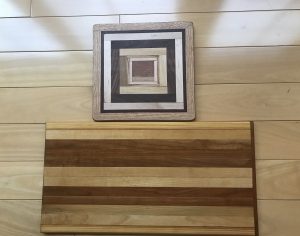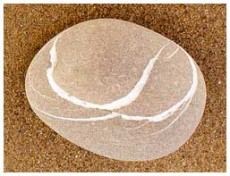
I keep it on the counter. I can’t use it because Dad, in crafting me a 17-by-9-inch cutting board for my home 13 years ago, polyurethaned it, poison for food. Impractical, it stands at one end of the soapstone countertop, propped on the side of the refrigerator.
Dad loved wood grains. This treasure has stripes of southern yellow pine, birch, cherry and maple with gradations of color from sandy white to honey. An amateur woodworker, he started my four brothers on their way to becoming wood craftsmen, building contractors, wood turners, wood tinkerers. “Come into the basement shop with me,” he’d say after dinner.
They called it his workshop. He thought of it as play. He taught them at first; how to make boxes, cubes with legs I recall, what to do with plywood, which tools are for what project. Next they learned together. After an evening in the shop, he emerged with his sparkly smile. “Look, we made a cocktail table. Guess what? We learned how to lay Formica.”
Then, at the end of his life, his boys taught him. In his eighties, he sat in their workshops and watched them draft architectural drawings, create, build. He’d say what carpenters say, “Measure twice. Cut once.” And he’d repeat what surgeons must do, “Keep your fingers away from the blades.”
He died ten years ago today, as I write this. After he died, we found books with titles like “America’s Handyman Book” a shop bible, it seemed. Always a student. When we sorted his things, most of us, his seven children, said they didn’t want much. One, the one for whom Dad had decades ago bought a drum set in Boston so this son could play in a teen-age rock band, said he wanted Dad’s record collection. We all agreed that the brother who had taken trumpet lessons from Dad should have his trumpet. I wanted some of his woodworkings, wood-playings, mostly taken from what was deemed junk. Someone said, “you don’t want this. You can’t use it. He polyed it.”
I did want it. I also grabbed from the trash a 9-by-9-inch board roughly hewn from mosaic inlaid scraps of poplar, oak, mahogany, maple, walnut, pine, red oak, with a cherry center. This small unevenly cut square stands in my bedroom closet. “Mornin’, Dad,” I smile at him every day as I reach for a sweater. He graces that space.
And the one on the kitchen counter? “Hi, Dad,” I say as I measure a cup of breakfast oatmeal, chop a lunch salad, bake dinner potatoes.
When people die, they don’t really leave. When I spot his woodworking, I smell sawdust, hear saws buzzing, see his torn faded yellow one-piece coverall jumpsuit, splotched with paint. When I hear Satchmo, Sarah Vaughan or Ella Fitzgerald, I hear Dad’s scat and the echoes from music in the shop. When I touch my unusable cutting boards, I feel his hand in mine, telling me, “Nothing’s perfect. The key is: are you enjoying what you’re doing?”
When people die, we get what’s left, their stuff, their objects, their lessons, their words. When people die, they stay in our hearts, in our memories.
Ten years is a nano-second and an eternity. Dad never met my four grandchildren. I’m sad about that. They never knew him, but I show them these flawed creations and say, “It’s ok, they’re beautiful and he had fun making them.”
They nod, “Good to know.”
When people die, their legacy lives on. And that really is good to know.



Lovely tribute to your dear dab, Sue!
I have a clock that he made me. And…his gold, paint speckled zip-front worksuit that he wore in the workshop❤